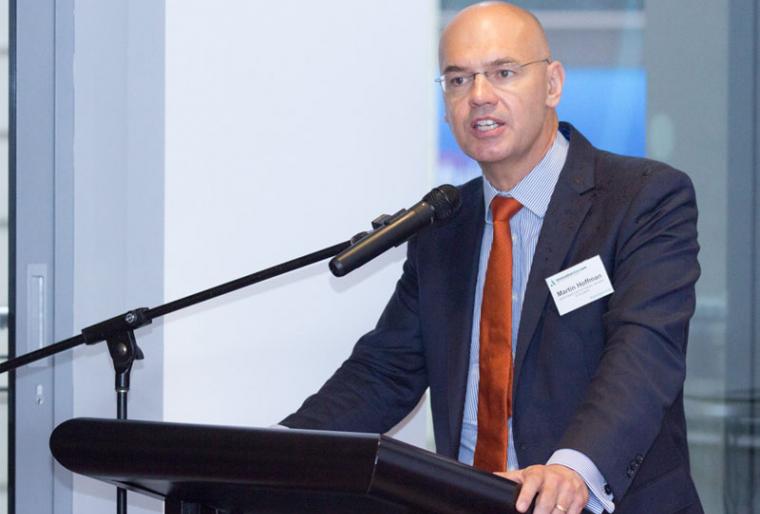The federal government is “seeking advice” about the appointment of former National Disability Insurance Agency chief executive Martin Hoffman to the board of a tech company that sells platform software to NDIS service providers.
Mr Hoffman resigned from his $720,000-a-year position running the NDIA in June, just as the Minister for Government Services and the National Disability Insurance Scheme Bill Shorten was sworn in as part of the newly elected Albanese Government.
The resignation came just a week after a massive security breach at a cloud-based client management system used by NDIS service providers exposed a “large volume” of health and other sensitive data, and as the Administrative Appeals Tribunal has been put under unprecedented strain through a deluge of NDIS complaints.
Mr Hoffman has now been appointed to the board of Bridge SaaS, a software company that sells a platform system to NDIS service providers and has been restructured in readiness for a listing on the Australian Stock Exchange.
The appointment has raised eyebrows among campaigners for a reform of the NDIS.
Bridge SaaS is known to have got the lawyers in before appointing Mr Hoffman to its board to ensure that it did not breach any obligations Mr Hoffman had under his NDIS chief executive officer contract.

Bridge SaaS chief executive Jamie Conyngham told InnovationAus.com in a one line response to a series of questions about the appointment that “Martin Hoffman is fully compliant with his NDIA CEO contract.”
A senior government source told InnovationAus.com that the newly-elected Labor government was “very unhappy” at Mr Hoffman’s new role and was “seeking advice” in relation to his obligations.
Bridge SaaS was formerly known as JN Solutions Australia, a software development company set up by Vault Cloud chief executive Rupert Taylor in 2008 and specialising in building and selling secure CRM and payment software to providers in the government-led employment services market.
With its impending IPO as Bridge SaaS, the company is focused on providing software platform services to the NDIS’ thousands of service providers.
Other than Mr Hoffman, who’s appointment as a director has not yet landed in the company’s ASIC filings, Bridge SaaS directors include Mr Conyngham, Mr Taylor-Price, former Xero global head of sales Leanne Graham, and serial non-executive director Gianin Zogg.
Mr Hoffman had overseen a tumultuous period at the National Disability Insurance Agency in 2019. A Senate Estimates hearing in 2019 revealed that former NDIS minister Stuart Robert had made requests to the Remuneration Tribunal to increase the salary of the NDIA CEO role from a maximum of $554,220 a year by more than $160,000. The request was made before Mr Hoffman was named as NDIS chief executive.
Mr Hoffman oversaw the introduction of Independent Assessments at the NDIS, the so-called robo-planning regime that used an automated process to determine NDIS support packages through the creation of 400 ‘profiles’.
Critics of the Independent Assessment model say the government has broken trust with NDIS participants, which has in turn led to the spiralling numbers of complaints about the system, and the massive case load at the Administrative Appeals Tribunal.
Before joining the NDIA, Mr Hoffman had been tapped by the former Minister for Government Services Stuart Robert to develop a plan under a six-week contract for the delivery of government services under the Services Australia organisation.
Global consultants McKinsey and KPMG shared an $858,000 contract for the six-week job, working directly with Mr Hoffman on the review, who was paid separately by Services Australia.
Do you know more? Contact James Riley via Email.


Bridge, and a number of other similar companies, seem to be in the middle of the NDIS between end users and the taxpayers making a lot of money for not doing all that much. Given what they actually do it’s worth considering what the NDIS would look like if it were delivered by the, ironically Liberal, NSW Government. There it likely would have gone through their digital customer service arm which delivers fairly good quality digital services, without colossal private profit extraction.
Why is an ALP policy, and now an ALP government, diverting so much money to private companies when there is at least one government that shows it is possible to do a reasonable amount, fairly well, in-house? It’s a strange situation to be in, given the parties of the respective governments, and the stated goal of this federal government to build digital capacity internally.
It’s worth noting that Mr. Taylor-Price’s other business, Vault Cloud, also seems to be providing something government should be able to do itself. Mr. Taylor-Price also seems to be extremely politically connected. Is anyone aware if he’s a member of a political party? It would certainly be a very bad look if he turned out to be a member of the same party as the government, making loads of money for basic services the government should be able to, and says it wants to, deliver itself.
Jetting money out to private companies run by politically connected individuals while stating you want to do more internally – with the example of NSW Government evident to all – seems like a troublesome set of ingredients . To be fair some elements of the NSW model might not work in Canberra. But surely the objective should be to try to achieve, roughly, a similar level of internal service delivery capacity.
All I can say is that there’s definitely a bit of a whiff around Mr. Taylor-Price and people would do well to drive defensively, not take any shortcuts, and get their paperwork and ducks in a row if they decide to procure his services in earnest. If you conclude it’s the best service then so be it, but personally I have a feeling this isn’t the last we’ll hear of him in contexts like this. A similar company to Vault Cloud, UKCloud, just went into compulsory liquidation in the UK, a much larger market, leaving egg of the faces of those who procured from them. Caveat Emptor.